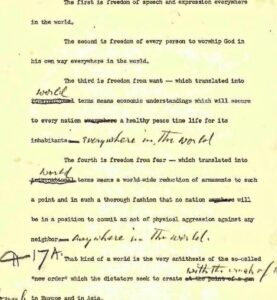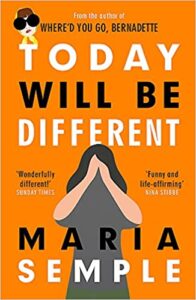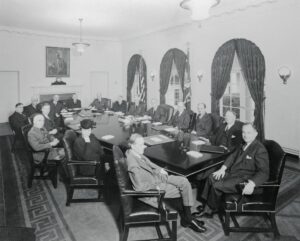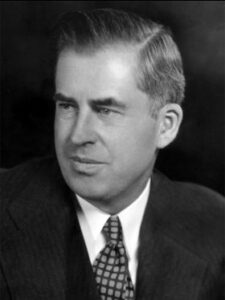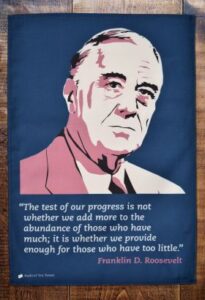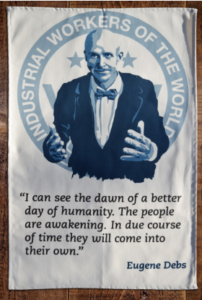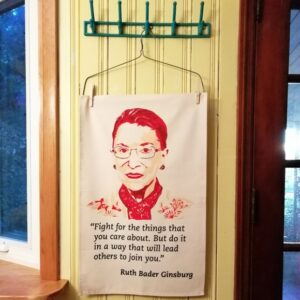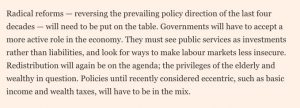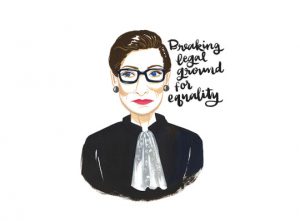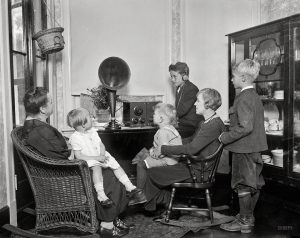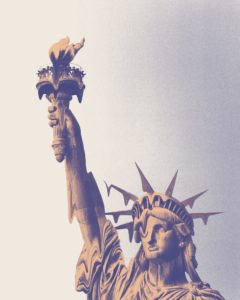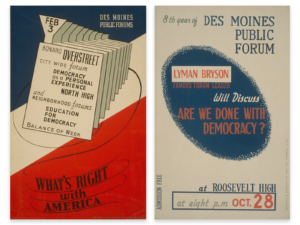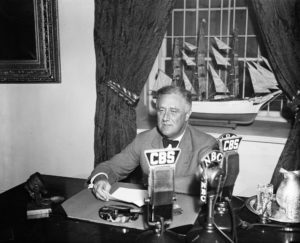FDR
Saturday, March 26th, 2022
March 26, 2022From historian Michael Beschloss:
FDR gave “Four Freedoms” speech to Congress on eve of US entry in World War II, 1941–here are his changes on the fifth draft:
Eleanor Roosevelt:
‘At all times, day by day, we have to continue fighting for freedom of religion, freedom of speech, and freedom from want—for these are the things that must be gained in peace as well as in war.’
April 15, 1943 My Day ❀
From her 1963 book, Tomorrow is Now:
‘In a sense, nearly all great civilizations that perished did so because they had crystallized, because they were incapable of adapting themselves to new conditions, new methods, new points of view. It is as though people would literally rather die than change.’
History will no doubt consider this to be his finest speech at a moment it was needed most. -dayle
President Biden:
“For God’s sake, this man cannot remain in power.”
“Their brave resistance is part of a larger fight for essential democratic principles that unite all free people. We stand with you. Period.”
Posted by Michael Marquardt, appointed by President Biden to the US Comm. Preservation of America’s Heritage Abroad:
‘Take it from this Berliner who was there when the Iron Curtain started falling in 1989, this is one of the most consequential speeches from an American president in decades. Thank you.’
Indeed.
Garry Kasparov, Chairman of the Human Rights Foundation:
‘No free world leader should hesitate to state plainly that the world would be a far better place if Putin were no longer in power in Russia. A good way to make that come about is to say exactly that. Russia will be a pariah until Putin is gone.
As I Worte today, Putin’s war in Ukraine and against the world order will not end as long as he is in power. Either the war criminal is isolated or he isn’t. No more half-measures.’
Humanity with all its fears,
with all its hopes of future years,
is hanging breathless on thy fate.
-Henry Wadsworth Longfellow
‘I don’t mean to ruin the ending for you, sweet child, but life is one long headwind. To make any kind of impact requires self-will bordering on madness. The world will be hostile, it will be suspicious of your intent, it will misinterpret you, it will inject you with doubt, it will flatter you into self-sabotage. My god, I’m making it sound so glamorous and personal! What the world is, more than anything? It’s indifferent.’
-Maria Semple, Today Will Be Different, p. 96
Love this…had no idea.
August 1, 2021President Roosevelt’s War Cabinet on Dec. 20, 1941. FDR is wearing a mourning band for his mother, who died 104 days earlier. [Photo: Bettmann Archive via Getty Images]
Ninety years on, descendants of the FDR administration have reconstituted his Cabinet in hopes of summoning a new New Deal from President Biden, Ruby Cramer writes for Politico Magazine:
The group, which has been meeting nearly weekly since last June, wants Biden to embrace “activist” government, Cramer writes:
- “They want him to eliminate the filibuster. They spend hours parsing his words for echoes of the stirring language that helped defeat the Great Depression.”
Henry S. Wallace, 69, grandson of Henry A. Wallace, the second for FDR’s three VPs, said: “The New Deal would have been impossible under today’s filibuster regimen … In FDR, his first 100 days, he got 15 major pieces of legislation passed, every single one was subject to nothing more than the majority.”
[AXIOS & Politico Magazine]
The greatest president we never had.
October 13, 2020Henry Wallace
(Picture: Wikimedia Commons)
One of the very best almost-presidents was Henry Wallace (1888-1965) – and he came much, much closer than most.
‘Born into a wealthy Iowa farming family, Wallace hadn’t had the working-class background of a Bernie Sanders or Alexandra Ocasio-Cortez. But he certainly had the political instinct for compassion and social justice.
During the 1920s, he rose to prominence lobbying for federal relief to poor farmers which was consistently denied by the traditionally progressive Republican Party.
This led him, in 1932, to switch over to the Democratic Party of Franklin Roosevelt, which was promising America a New Deal in the wake of the Wall Street Crash.
Thankfully, Roosevelt won and he made Wallace his Secretary of Agriculture.
In 1940, after years of steadfast support for FDR’s New Deal, Roosevelt chose Wallace to be his new running mate. Wallace then served four years as Vice-President of the United States from 1941-5.
Henry Wallace was one of the most progressive members of Roosevelt’s administration.’
‘Championing economic democracy and internationalism, he said,
“Some have spoken of the ‘American Century’. I say that the century on which we are entering – the century which will come into being after this war – can be and must be the century of the common man… No nation will have the God-given right to exploit other nations. Older nations will have the privilege to help younger nations get started on the path to industrialisation, but there must be neither military nor economic imperialism.”
As Secretary of Agriculture, he spearheaded the Agricultural Adjustment Act of 1933 which used federal intervention to boost the price of farm goods to support the embattled rural economy.
Wallace also backed FDR’s effort to take on the fascist powers from the late-thirties onward, denouncing Nazi racial theory as a “mumbo-jumbo of dangerous nonsense”.
Wallace made the role of VP more dynamic than it had ever been.
He led the Democratic presidential campaign of 1940 from the front before playing a crucial role in the wartime government as chair of Roosevelt’s Board of Economic Warfare.
On 8th May 1942, Wallace gave the most remarkable speech ever given by a US President or Vice-President.
Scared of Wallace’s progressive beliefs – his anti-imperialism, his commitment to economic justice, and, especially, his open opposition to Jim Crow – the Democratic establishment pushed him off the ballot in 1944, replacing him with the hapless conservative, Harry Truman, all against the wishes of the Democrats’ base.
The post-war period might have gone much better – for America and the world – had Wallace succeeded Roosevelt in 1945 rather than the trigger-happy and hawkish Truman.
While our immediate priority is to kick its current resident out at the ballot box, the story of Henry Wallace shows that the White House needn’t be a home to scandal, incompetence, and prejudice.
One day, perhaps, we could install someone like Wallace and make the Presidency an institution of virtue and vision like it has so rarely been before.’
~Pete, Radical Tea Towel
‘Radical Reforms’
April 4, 2020Rutger Bregman:
“Wow, Financial Times editorial today. ‘Radical reforms — reversing the policy direction of the last four decades — will need to be put on the table. (…) Policies until recently considered eccentric, such as basic income and wealth taxes, will have to be in the mix.'”
FINANCIAL TIMES
EDITORIAL BOARD
Virus lays bare the frailty of the social contract
Radical reforms are required to forge a society that will work for all
If there is a silver lining to the Covid-19 pandemic, it is that it has injected a sense of togetherness into polarised societies. But the virus, and the economic lockdowns needed to combat it, also shine a glaring light on existing inequalities — and even create new ones. Beyond defeating the disease, the great test all countries will soon face is whether current feelings of common purpose will shape society after the crisis. As western leaders learnt in the Great Depression, and after the second world war, to demand collective sacrifice you must offer a social contract that benefits everyone.
Today’s crisis is laying bare how far many rich societies fall short of this ideal. Much as the struggle to contain the pandemic has exposed the unpreparedness of health systems, so the brittleness of many countries’ economies has been exposed, as governments scramble to stave off mass bankruptcies and cope with mass unemployment. Despite inspirational calls for national mobilisation, we are not really all in this together.
The economic lockdowns are imposing the greatest cost on those already worst off. Overnight millions of jobs and livelihoods have been lost in hospitality, leisure and related sectors, while better paid knowledge workers often face only the nuisance of working from home. Worse, those in low-wage jobs who can still work are often risking their lives — as carers and healthcare support workers, but also as shelf stackers, delivery drivers and cleaners.
Governments’ extraordinary budget support for the economy, while necessary, will in some ways make matters worse. Countries that have allowed the emergence of an irregular and precarious labour market are finding it particularly hard to channel financial help to workers with such insecure employment. Meanwhile, vast monetary loosening by central banks will help the asset-rich. Behind it all, underfunded public services are creaking under the burden of applying crisis policies.
The way we wage war on the virus benefits some at the expense of others. The victims of Covid-19 are overwhelmingly the old. But the biggest victims of the lockdowns are the young and active, who are asked to suspend their education and forgo precious income. Sacrifices are inevitable, but every society must demonstrate how it will offer restitution to those who bear the heaviest burden of national efforts.
Radical reforms — reversing the prevailing policy direction of the last four decades — will need to be put on the table. Governments will have to accept a more active role in the economy. They must see public services as investments rather than liabilities, and look for ways to make labour markets less insecure. Redistribution will again be on the agenda; the privileges of the elderly and wealthy in question. Policies until recently considered eccentric, such as basic income and wealth taxes, will have to be in the mix.
The taboo-breaking measures governments are taking to sustain businesses and incomes during the lockdown are rightly compared to the sort of wartime economy western countries have not experienced for seven decades. The analogy goes still further.
The leaders who won the war did not wait for victory to plan for what would follow. Franklin D Roosevelt and Winston Churchill issued the Atlantic Charter, setting the course for the United Nations, in 1941. The UK published the Beveridge Report, its commitment to a universal welfare state, in 1942. In 1944, the Bretton Woods conference forged the postwar financial architecture. That same kind of foresight is needed today. Beyond the public health war, true leaders will mobilize to win the peace.
RBG
March 28, 2020-Tony Dokoupil, CBS This Morning co-host
In 2009, I interviewed Ruth Bader Ginsburg about the “upsides” of the Great Depression, which got me mocked on Gawker. (Deserved it.) It was part of a series with people who lived through the Depression and it got burned off the web in the many fires of Newsweek’s demise.But I found the original text in an old email this morning and as we confront another hard time, I thought this passage from Justice Ginsburg was especially worth bearing in mind:
“I can’t say that I knew about the breadlines. But as an adult I found it hard to understand why a country with our resources had such great discrepancies between the rich and poor. Fortunately, there has been significant change in that regard…
“Today we would never allow what happened during the Depression to happen again—we would never just leave people totally without resources…”
“We have the Depression to thank for that. It helped the country accept what our European allies had long understood: that the poor were the responsibility of the whole community…
“Social security, unemployment benefits, FDIC-such programs never would have passed without the Depression. They would have been called Socialist. So, yes, I think the Depression left the country better off.”
Imagine that.
‘Don’t ask whether you need an umbrella. Go outside and stop the rain.’
January 27, 2020“It’s not too late,” Jimmy Stewart pleaded with Congress, rasping, exhausted, in “Mr. Smith Goes to Washington,” in 1939. “Great principles don’t get lost once they come to light.” It wasn’t too late. It’s still not too late.
New Dealers were trying to save the economy; they ended up saving democracy. They built a new America; they told a new American story. On New Deal projects, people from different parts of the country labored side by side, constructing roads and bridges and dams, everything from the Lincoln Tunnel to the Hoover Dam, joining together in a common endeavor, shoulder to the wheel, hand to the forge. Many of those public-works projects, like better transportation and better electrification, also brought far-flung communities, down to the littlest town or the remotest farm, into a national culture, one enriched with new funds for the arts, theatre, music, and storytelling. With radio, more than with any other technology of communication, before or since, Americans gained a sense of their shared suffering, and shared ideals: they listened to one another’s voices.
This didn’t happen by accident. Writers and actors and directors and broadcasters made it happen. They dedicated themselves to using the medium to bring people together. Beginning in 1938, for instance, F.D.R.’s Works Progress Administration produced a twenty-six-week radio-drama series for CBS called “Americans All, Immigrants All,” written by Gilbert Seldes, the former editor of The Dial. “What brought people to this country from the four corners of the earth?” a pamphlet distributed to schoolteachers explaining the series asked. “What gifts did they bear? What were their problems? What problems remain unsolved?” The finale celebrated the American experiment: “The story of magnificent adventure! The record of an unparalleled event in the history of mankind!”
The year 1935 happened to mark the centennial of the publication of Alexis de Tocqueville’s “Democracy in America,” an occasion that elicited still more lectures from European intellectuals coming to the United States to remark on its system of government and the character of its people, close on Tocqueville’s heels.
The endless train of academics were also called upon to contribute to the nation’s growing number of periodicals. In 1937, The New Republic, arguing that “at no time since the rise of political democracy have its tenets been so seriously challenged as they are today,” ran a series on “The Future of Democracy,” featuring pieces by the likes of Bertrand Russell and John Dewey. “Do you think that political democracy is now on the wane?” the editors asked each writer. The series’ lead contributor, the Italian philosopher Benedetto Croce, took issue with the question, as philosophers, thankfully, do. “I call this kind of question ‘meteorological,’ ” he grumbled. “It is like asking, ‘Do you think that it is going to rain today? Had I better take my umbrella?’ ” The trouble, Croce explained, is that political problems are not external forces beyond our control; they are forces within our control. “We need solely to make up our own minds and to act.”
Don’t ask whether you need an umbrella. Go outside and stop the rain.
Here are some of the sorts of people who went out and stopped the rain in the nineteen-thirties: schoolteachers, city councillors, librarians, poets, union organizers, artists, precinct workers, soldiers, civil-rights activists, and investigative reporters. They knew what they were prepared to defend and they defended it, even though they also knew that they risked attack from both the left and the right. Charles Beard (Mary Ritter’s husband) spoke out against the newspaper tycoon William Randolph Hearst, the Rupert Murdoch of his day, when he smeared scholars and teachers as Communists. “The people who are doing the most damage to American democracy are men like Charles A. Beard,” said a historian at Trinity College in Hartford, speaking at a high school on the subject of “Democracy and the Future,” and warning against reading Beard’s books—at a time when Nazis in Germany and Austria were burning “un-German” books in public squares. That did not exactly happen here, but in the nineteen-thirties four of five American superintendents of schools recommended assigning only those U.S. history textbooks which “omit any facts likely to arouse in the minds of the students question or doubt concerning the justice of our social order and government.”
The federal government stopped funding the forum program in 1941. Americans would take up their debate about the future of democracy, in a different form, only after the defeat of the Axis. For now, there was a war to fight. And there were still essays to publish, if not about the future, then about the present. In 1943, E. B. White got a letter in the mail, from the Writers’ War Board, asking him to write a statement about “The Meaning of Democracy.” He was a little weary of these pieces, but he knew how much they mattered. He wrote back, “Democracy is a request from a War Board, in the middle of a morning in the middle of a war, wanting to know what democracy is.” It meant something once. And, the thing is, it still does. ♦
[full article]
https://www.newyorker.com/magazine/2020/02/03/the-last-time-democracy-almost-died?
Champions of Democracy
October 7, 2019Modeled after FDR’s historic 1941 speech to Congress, laureates receive honors in the following categories: freedom of speech and expression, freedom of worship, freedom from want, freedom from fear, and the freedom medal.
“Today’s political moment calls for a regrounding in Rooseveltian values, which each of this year’s laureates embodies. As FDR told our nation almost 80 years ago, we must never give up our fight for democracy.”
Roosevelt Institute Presents 2019 Four Freedoms Awards to Champions of Democracy
Oct. 5th
Ceremony highlights the importance of democratic values in a challenging political landscape
‘Today, the Roosevelt Institute celebrated the Four Freedoms Awards, honoring Franklin and Eleanor Roosevelt’s legacies and those who exemplify core freedoms that uphold our democracy. The Four Freedoms Awards are presented in alternating years by the Roosevelt Institute in the US and Roosevelt Stichting in the Netherlands, FDR’s ancestral home. For the first time since 2011, the New York event has returned to Hyde Park and was attended by 265 people, including Han Polman, King’s Commissioner in the Province of Zeeland & Chair of the Roosevelt Foundation and a delegation of over 30 from the Netherlands.
This year’s recipients are:
- Freedom Medal: Lonnie Bunch for his significant contributions to American culture and society as a historian and storyteller. Bunch is the founding director of the National Museum of African American History and Culture and is currently secretary of the Smithsonian Institution. He is the first African American to hold this position.
- Freedom of Speech and Expression: The Boston Globe for its call to news organizations to publish editorials in support of a free press and their critical role in democracy.
- Freedom of Worship: Krista Tippett for her honest pursuit of ancient and enduring human questions about our spiritual traditions.
- Freedom from Want: Franklin Thomas for dedicating his life to public service, community development, and philanthropy. Thomas was the first African American president of the Ford Foundation, where he focused on issues relating to urban poverty, human rights, and anti-apartheid initiatives.
- Freedom from Fear: Sandy Hook Promise for recognizing the need to build community and engage in powerful advocacy around gun violence following an unthinkable tragedy.
“The Four Freedoms Awards represent a continuing dedication to the values my grandparents, Franklin and Eleanor Roosevelt, so embodied—beliefs around human freedoms and security, shared well-being, and the importance and strength of the democratic process,” said Anna Eleanor Roosevelt, Board Chair of the Roosevelt Institute. “I am so pleased that this event has returned home to Hyde Park. It’s not only the birthplace and home of my grandfather, but it’s especially important as the site of his Presidential Library and Museum.”
“The Four Freedoms and those who champion them are more important now than ever,” said Felicia Wong, President and CEO of the Roosevelt Institute.“Today’s political moment calls for a regrounding in Rooseveltian values, which each of this year’s laureates embodies. As FDR told our nation almost 80 years ago, we must never give up our fight for democracy.”
Past recipients of the Four Freedoms Awards include Presidents Truman, Kennedy, Carter, and Clinton; international luminaries, such as Nelson Mandela and the Dalai Lama; and treasured Americans, including Supreme Court Associate Justice Ruth Bader Ginsburg, journalist Dan Rather, civil rights leader Coretta Scott King, and Equal Justice Initiative founder Bryan Stevenson. You can learn more about the Four Freedoms Awards here.
About the Franklin D. Roosevelt Presidential Library and Museum
The Franklin D. Roosevelt Presidential Library and Museum is America’s first presidential library—and the only one used by a sitting president. Conceived and built under President Roosevelt’s direction and opened to the public in 1941, the Library is administered by the National Archives and Records Administration. Members and donors form a vital base of support for many of the Library’s key initiatives and help keep our doors open to visitors and students from around the world.
About the Roosevelt Institute
Until economic and social rules work for all Americans, they’re not working. Inspired by the legacy of Franklin and Eleanor, the Roosevelt Institute reimagines the rules to create a nation where everyone enjoys a fair share of our collective prosperity. We are a 21st-century think tank, bringing together multiple generations of thinkers and leaders to help drive key economic and social debates and have local and national impact. The Roosevelt Institute is also the nonprofit partner to the FDR Presidential Library and Museum.
To keep up to date with the Roosevelt Institute, please visit us on Twitter or follow our work at #RewriteTheRules.
###
